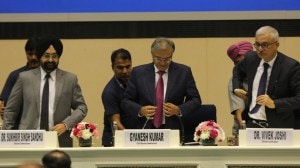Beed’s own fame Gurukul
In the heart of Maharashtra, Sondara Gurukulam at Dombri in Beed district, 125 kms from Ahmadnagar, has been giving hope and education to hu...

In the heart of Maharashtra, Sondara Gurukulam at Dombri in Beed district, 125 kms from Ahmadnagar, has been giving hope and education to hundreds of children of agricultural labourers — without any support from the government.
With a maximum of 20 children in a classroom and their informal relationship with the teachers, the gurukul — a project of Pune-based social worker K D Joshi — was founded in July 1986, with four huts made of palm mats and 41 students. Today, it is a residential school complex with a dormitory, a kitchen, a dairy, a swimming pool, and vegetable gardens. It has 114 students and 12 volunteers.
It was started for the children of landless labourers who have to go to other parts of the state for work. With time, support came along.
“In 1989, the children themselves laid the foundation for the dormitory,’’ said Sudham Bhondwe, who now runs the school, assisted by his wife Sindhu. “Then, there were no facilities, and if a child fell ill, there was no concrete road to take him to the nearest hospital in Beed,’’ he recalls. The huts used to leak in rain.
For Bhondwe too, it’s been a long journey. In the 1980s, he used to run a grocery store in Beed. When the Deendayal Research Foundation choose Beed for the gurukul, he gave them the land (five acres) he had inherited. All for the children.
For students, the day starts with exercises at dawn and ends with self-study in the evening. The meals, jowar bhakri and vegetables, are cooked in open fire. Classes are conducted under neem and peepal trees. Their duties divided according to age, the students contribute at every level, right from helping in the kitchen to taking calls at the administration office. They are a confident lot and plan to study further.
|
District stats
|
|||||
|
• Mumbai: Beed, in the Marathwada region, is 400 kms from Mumbai. One of the most under-developed districts of Maharashtra, 30 per cent of its poulation is below poverty line. Most people are dependant on agriculture and only 49 per cent are literate. The district has no major industry. |
|||||
Like Datta Nalawade, who pursued higher education, and started a school in Beed, on the lines of the gurukul. Or Ramdas Awte, a farmer’s son, who worked at the gurukul for some years.
This year, the gurukul received 100 applications, and the faculty is upbeat.
“We plan to start a girls’ school soon. We are also hoping to get more teachers,’’ said Ratnaprabha Hansegaonkar, a teacher at the gurukul.
Photos



- 01
- 02
- 03
- 04
- 05




























